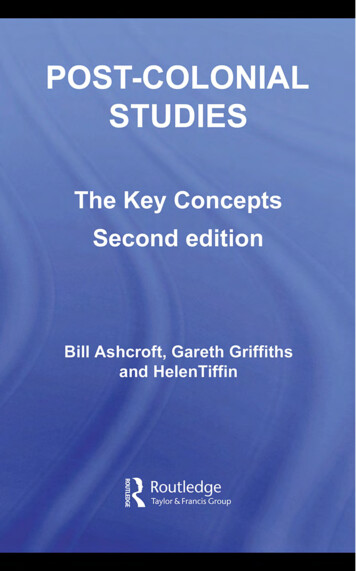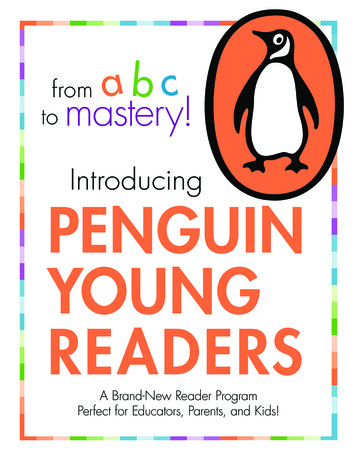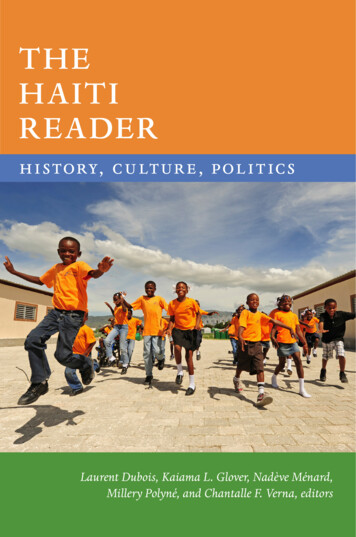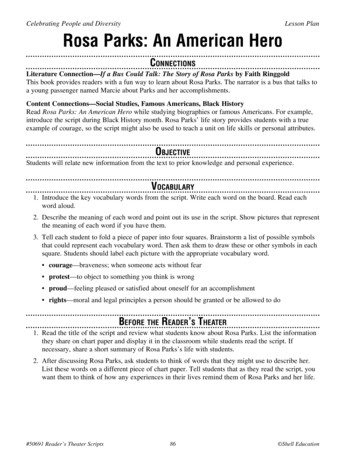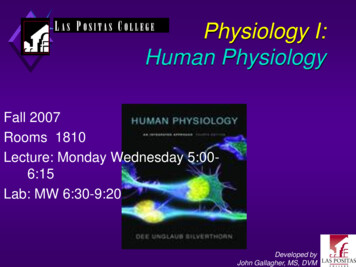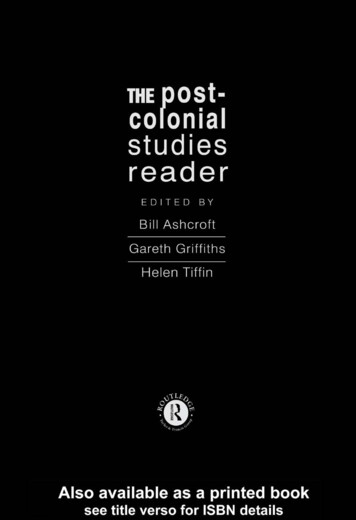
Transcription
THE POST-COLONIAL STUDIES READEROne of the most exciting features of English literatures today is the explosion of post-colonial literatures, those literatures written in English in formerlycolonised societies. This field has given rise to a great range of theoreticalideas, concepts, problems and debates, and these have been addressedin a great range of articles, essays, talks and books published or writtenfrom every continent. This book brings together a selection of thesetheoretical issues in a way that indicates and celebrates the immense diversity of post-colonial theory. As such it will be an indispensable volume forstudents, teachers, researchers and theorists, and anybody interested inthe field.The book has fourteen sections, each dealing with a major concept or issuein post-colonial theory. Each section is introduced by the editors and includesup to seven extracts from various theorists. As well as fundamental postcolonial issues, such as Language, Place, History and Ethnicity, it alsoassesses the similarities and differences with postmodernism, exploresconcepts such as Hybridity and The Body and Performance, and also examines the very important material practice? of Education, Production andConsumption, and the modes of Representation and Resistance.The uniqueness of this volume is in its range and comprehensiveness. Bybringing together nearly ninety extracts from over fifty different writers, itdemonstrates the vast spread of post-colonial theory, the degree to whichsuch theory is emerging outside the metropolitan intellectual centres, andthe significance such theory has in the practical political issues of living inthis range of societies. This book makes accessible the full range ofpostcolonial theory, which otherwise would be either difficult or impossiblefor students, teachers or researchers to fully utilize.Bill Ashcroft, Gareth Griffiths and Helen Tiffin teach at the Universities ofNew South Wales, Western Australia and Queensland respectively. Togetherthey are the authors of The Empire Writes Back (Routledge 1989).
Related titles from RoutledgeTHE CULTURAL STUDIES READEREdited by Simon DuringTHE LESBIAN AND GAY STUDIES READEREdited by Henry Abelove, Michele Aina Barale, and David HalperinTHE NEW HISTORICISM READEREdited by Harold Veeser
ThePOST-COLONIALSTUDIES READEREdited byBill Ashcroft, Gareth Griffithsand Helen TiffinLondon and New York
First published 1995by Routledge11 New Fetter Lane, London EC4P 4EESimultaneously published in the USA and Canadaby Routledge29 West 35th Street, New York, NY 10001Routledge is an imprint of the Taylor & Francis GroupThis edition published in the Taylor & Francis e-Library, 2003. 1995 Bill Ashcroft, Gareth Griffiths and Helen Tiffin for editorial andintroductory material, individual extracts 1995 the contributorsAll rights reserved. No part of this book may be reprinted or reproducedor utilized in any form or by any electronic, mechanical, or other means,now known or hereafter invented, including photocopying and recording,or in any information storage or retrieval system, without permission inwriting from the publishers.British Library Cataloguing in Publication DataA catalogue record for this book is available from the British LibraryLibrary of Congress Cataloguing in Publication DataThe Post-colonial Studies Reader/edited by Bill Ashcroft, Gareth Griffiths,and Helen Tiffin.p. cm.Includes bibliographical references and index.1. Commonwealth literature (English)—History and criticism.2. Decolonization in literature. 3. Imperialism in literature.4. Colonies in literature. I. Ashcroft, Bill.II. Griffiths, Gareth. III. Tiffin, Helen.PR9080.P57 1994820.9'358–dc20 94–17829ISBN 0-203-42306-2 Master e-book ISBNISBN 0-203-73130-1 (Adobe eReader Format)ISBN 0-415-09621-9 (hbk)ISBN 0-415-09622-7 (pbk)
ContentsList of Illustrations xiiiPreface xvAcknowledgements xviiGeneral Introduction 1Part I Issues and DebatesIntroduction71 The Occasion for Speaking12George Lamming2 The Economy of Manichean Allegory18Abdul R.JanMohamed3 Can the Subaltern Speak?24Gayatri Chakravorty Spivak4 Signs Taken for Wonders29Homi K.Bhabha5 Problems in Current Theories ofColonial Discourse 36Benita Parry6 The Scramble for Post-colonialismStephen SlemonPart II Universality and DifferenceIntroduction 557 Colonialist CriticismChinua Achebev5745
CONTENTS8 Heroic Ethnocentrism: TheIdea of Universality in Literature 62Charles Larson9 Entering Our Own Ignorance: SubjectObject Relations inCommonwealth Literature 66Flemming Brahms10 Western Mathematics: The Secret Weaponof Cultural Imperialism 71Alan J.Bishop11 Jameson’s Rhetoric of Otherness and the‘National Allegory’ 77Aijaz AhmadPart III Representation and ResistanceIntroduction 8512 Orientalism87Edward W.Said13 A Small Place 92Jamaica Kincaid14 Post-colonial Literatures andCounter-discourse 95Helen Tiffin15 Figures of Colonial Resistance99Jenny Sharpe16 Unsettling the Empire: ResistanceTheory for the Second World 104Stephen Slemon17 The Rhetoric of English India 111Sara SuleriPart IV Postmodernism and Post-colonialismIntroduction 11718 The Postcolonial and thePostmodern 119Kwame Anthony Appiah19 Postmodernism or Post-colonialismToday 125Simon Duringvi
CONTENTS20 Circling the Downspout of Empire130Linda Hutcheon21 The White Inuit Speaks: Contaminationas Literary Strategy 136Diana Brydon22 The Politics of the Possible143Kumkum SangariPart V NationalismIntroduction 15123 National Culture153Frantz Fanon24 Fanon, Cabral and Ngugi onNational Liberation 158Chidi Amuta25 Nationalism as a Problem164Partha Chatterjee26 The Discovery of Nationality in Australianand Canadian Literatures 167Alan Lawson27 The National Longing for Form170Timothy Brennan28 Dissemination: Time, Narrative, and theMargins of the Modern Nation 176Homi K.Bhabha29 What Ish My Nation?178David Cairns and Shaun RichardsPart VI HybridityIntroduction 18330 Fossil and Psyche185Kirsten Holst Petersen and Anna Rutherford31 Named for Victoria, Queenof England 190Chinua Achebe32 Of the Marvellous Realism ofthe Haitians 194Jacques Stephen Aléxisvii
CONTENTS33 Marvellous Realism: The Wayout of Negritude 199Michael Dash34 Creolization in Jamaica 202Edward Kamau Brathwaite35 Cultural Diversity and CulturalDifferences 206Homi K.BhabhaPart VII Ethnicity and IndigeneityIntroduction 21336 No Master Territories215Trinh T.Minh-ha37 Who is Ethnic?219Werner Sollors38 New Ethnicities223Stuart Hall39 White Forms, Aboriginal Content228Mudrooroo40 The Representation of the Indigene 232Terry Goldie41 The Myth of Authenticity 237Gareth Griffiths42 Who Can Write as Other?242Margery FeePart VIII Feminism and Post-colonialismIntroduction 24943 First Things First: Problems of a FeministApproach to African Literature 251Kirsten Holst Petersen44 Decolonizing Culture: Toward a Theory forPost-colonial Women’s Texts 255Ketu H.Katrak45 Under Western Eyes: Feminist Scholarshipand Colonial Discourses 259Chandra Talpade Mohantyviii
CONTENTS46 Writing Postcoloniality andFeminism 264Trinh T.Minh-ha47 Three Women’s Texts and a Critiqueof Imperialism 269Gayatri Chakravorty Spivak48 Woman Skin Deep: Feminism andthe Postcolonial Condition 273Sara SuleriPart IX LanguageIntroduction 28349 The Language of African Literature285Ngugi wa Thiong’o50 The Alchemy of English 291Braj B.Kachru51 Language and Spirit296Raja Rao52 Constitutive Graphonomy298Bill Ashcroft53 New Language, New World 303W.H.New54 Nation Language309Edward Kamau Brathwaite55 Relexification314Chantal ZabusPart X The Body and PerformanceIntroduction 32156 The Fact of Blackness 323Frantz Fanon57 Jazz and the West Indian Novel 327Edward Kamau Brathwaite58 In Search of the Lost Body: Redefining theSubject in Caribbean Literature 332Michael Dashix
CONTENTS59 The Body as Cultural Signifier336Russell McDougall60 Dance, Movement and ResistancePolitics 341Helen Gilbert61 Feminism and the Colonial Body346Kadiatu Kanneh62 Outlaws of the Text 349Gillian WhitlockPart XI HistoryIntroduction 35563 Allegories of Atlas358José Rabasa64 Columbus and the Cannibals365Peter Hulme65 The Muse of History370Derek Walcott66 Spatial History375Paul Carter67 The Limbo Gateway378Wilson Harris68 Postcoloniality and the Artificeof History 383Dipesh ChakrabartyPart XII PlaceIntroduction 39169 Unhiding the Hidden 394Robert Kroetsch70 Writing in Colonial Space397Dennis Lee71 Naming Place402Paul Carter72 Decolonizing the MapGraham Hugganx407
CONTENTS73 Aboriginal Place412Bob Hodge and Vijay Mishra74 Ecological Imperialism418Alfred W.CrosbyPart XIII EducationIntroduction 42575 Minute on Indian Education428Thomas Macaulay76 The Beginnings of English Literary Studyin British India 431Gauri Viswanathan77 On the Abolition of the EnglishDepartment 438Ngugi wa Thiong’o78 The Neocolonial Assumption in UniversityTeaching of English 443John Docker79 Ideology in the Classroom: A Case Studyin the Teaching of English Literaturein Canadian Universities 447Arun P.Mukherjee80 Education and Neocolonialism452Philip G.Altbach81 The Race for Theory457Barbara ChristianPart XIV Production and ConsumptionIntroduction 46382 The Historiography of African LiteratureWritten in English 465André Lefevere83 Singapore: Poet, Critic, AudiencePeter Hyland84 Postcolonial Culture,Postimperial Criticism 475W.J.T.Mitchellxi471
CONTENTS85 The Book Today in Africa480S.I.A.Kotei86 Literary Colonialism: Books in theThird World 485Philip G.AltbachBibliography 491Index 514xii
Illustrations1 Diagram representing the debate over thenature of colonialism 462 Theme of expedition1893 Mercator’s world map3594 Jila Japingka by Peter Skipper 416xiii
PrefaceThis is the latest in a number of Readers published by Routledge and joinssuch earlier titles as The Cultural Studies Reader. The publishers insistedthat the title of The Post-colonial Studies Reader be congruent with theother readers which they publish. The authors are equally at pains to insisttherefore that the title is not meant to claim some kind of completeness ofcoverage or absolute authority. In a field as diverse and contentious aspostcolonial studies such a claim would be particularly extravagant andfoolish. However, the more than eighty extracts in this reader are designedto introduce the major issues and debates in the field of post-colonial literarystudies. This field itself has become so heterogeneous that no collection ofreadings could encompass every theoretical position now giving itself thename ‘postcolonial/post-colonial’. These terms themselves encapsulate anactive and unresolved dispute between those who would see thepostcolonial as designating an amorphous set of discursive practices, akinto postmodernism, and those who would see it as designating a morespecific, and ‘historically’ located set of cultural strategies. Even this latterview is divided between those who believe that post-colonial refers only tothe period after the colonies become independent and those who argue,as the editors of this book would, that it is best used to designate the totalityof practices, in all their rich diversity, which characterise the societies ofthe post-colonial world from the moment of colonisation to the present day,since colonialism does not cease with the mere fact of political independenceand continues in a neo-colonial mode to be active in many societies.The structure of the reader, the choice of subject areas and the selectionand excisions of the readings are naturally determined by the editors’preferences and thus amount to a theoretical statement. But we have triedto introduce arguments with which we are not necessarily in agreement,and we have tried to produce a reader which is above all a stimulus todiscussion, thought and further exploration. The parameters we have chosenwill no doubt seem unsatisfactory to some: in order to achieve as wide arepresentation of areas and approaches as possible most extracts arelimited to about two thousand words and will thus often not encompass thewhole argument of the pieces from which they are taken; some theoristsxv
PREFACEmay seem to be under-represented given their importance to the field; someof the writers would not be considered ‘post-colonial’ theorists at all. Buteach extract is selected to say something coherent about an issue ofimmediate relevance to post-colonial practice, and represents what we havetaken to be the most interesting, provocative or stimulating aspect of theoriginal. Obviously, cultural and political critiques by general theorists suchas Foucault, Derrida, Terdiman, Gramsci, Althusser, etc. have beeninfluential in the construction of many post-colonial critical accounts butwe have not included these in the reader since they are already easilyaccessible. This reader is not a collection of theorists, but of ideas; it is notinterested in establishing a canon of theories or theorists but in indicatingsomething of the great scope, the rich heterogeneity and vast energy ofthe field of postcolonial studies. We have been economical with footnotes,and if students or scholars wish to investigate the full argument and therange of sources of some of these pieces we direct them to the originals.xvi
AcknowledgementsFor help, patience and support we should like to thank our partners, Judy,Carolyn and Chris.For help in finding material, tracing references, editing and proofreadingwe want to thank many people, but particularly Tony da Silva and ChrisTiffin.For generous permission to publish these extracts we thank the manyjournals and publishers who have acceded to our requests, in many casespromptly and sometimes with helpful advice.xvii
General IntroductionWhen Arthur James Balfour stood up in the House of Commons, at theheight of British imperial power, on June 13 1910, to answer challengesto Britain’s presence in Egypt, Edward Said tells us (1978:32), he spokeunder the mantle of two indivisible foundations of imperial authority—knowledge and power. The most formidable ally of economic and politicalcontrol had long been the business of ‘knowing’ other peoples becausethis ‘knowing’ underpinned imperial dominance and became the modeby which they were increasingly persuaded to know themselves: that is,as subordinate to Europe. A consequence of this process of knowingbecame the export to the colonies of European language, literature andlearning as part of a civilising mission which involved the suppression ofa vast wealth of indigenous cultures beneath the weight of imperial control.The date of Balfour’s speech is significant. In just a few years Britishimperial power would begin to be dismantled by the effects of two worldwars and the rise of independence movements throughout the world. Thispolitical dismantling did not immediately extend to imperial culturalinfluences, but it was attended by an unprecedented assertion of creativeactivity in postcolonial societies.European imperialism took various forms in different times and placesand proceeded both through conscious planning and contingentoccurrences. As a result of this complex development something occurredfor which the plan of imperial expansion had not bargained: the immenselyprestigious and powerful imperial culture found itself appropriated in projectsof counter-colonial resistance which drew upon the many differentindigenous local and hybrid processes of self-determination to defy, erodeand sometimes supplant the prodigious power of imperial culturalknowledge. Post-colonial literatures are a result of this interaction betweenimperial culture and the complex of indigenous cultural practices. As aconsequence, ‘post-colonial theory’ has existed for a long time before thatparticular name was used to describe it. Once colonised peoples had causeto reflect on and express the tension which ensued from this problematicand contested, but eventually vibrant and powerful mixture of imperiallanguage and local experience, post-colonial ‘theory’ came into being.1
GENERAL INTRODUCTIONThe term ‘post-colonial’ is resonant with all the ambiguity and complexityof the many different cultural experiences it implicates, and, as the extractsin this Reader demonstrate, it addresses all aspects of the colonial processfrom the beginning of colonial contact. Post-colonial critics and theoristsshould consider the full implications of restricting the meaning of the termto ‘after-colonialism’ or after-Independence. All post-colonial societies arestill subject in one way or another to overt or subtle forms of neo-colonialdomination, and independence has not solved this problem. Thedevelopment of new élites within independent societies, often buttressedby neo-colonial institutions; the development of internal divisions based onracial, linguistic or religious discriminations; the continuing unequal treatmentof indigenous peoples in settler/invader societies—all these testify to thefact that post-colonialism is a continuing process of resistance andreconstruction. This does not imply that post-colonial practices are seamlessand homogeneous but indicates the impossibility of dealing with any part ofthe colonial process without considering its antecedents and consequences.Post-colonial theory involves discussion about experience of variouskinds: migration, slavery, suppression, resistance, representation, difference,race, gender, place, and responses to the influential master discourses ofimperial Europe such as history, philosophy and linguistics, and thefundamental experiences of speaking and writing by which all these comeinto being. None of these is ‘essentially’ post-colonial, but together theyform the complex fabric of the field. Like the description of any other fieldthe term has come to mean many things, as the range of extracts in thisReader indicates. However we would argue that post-colonial studies arebased in the ‘historical fact’ of European colonialism, and the diversematerial effects to which this phenomenon gave rise. We need to keep thisfact of colonisation firmly in mind because the increasingly unfocused useof the term ‘post-colonial’ over the last ten years to describe an astonishingvariety of cultural, economic and political practices has meant that there isa danger of its losing its effective meaning altogether. Indeed the diffusionof the term is now so extreme that it is used to refer to not only vastlydifferent but even opposed activities. In particular the tendency to employthe term ‘post-colonial’ to refer to any kind of marginality at all runs the riskof denying its basis in the historical process of colonialism.While drawing together a wide variety of theoretical and criticalperspectives, this Reader attempts to redress a process whereby ‘postcolonial theory’ may itself mask and even perpetuate unequal economicand cultural relations. This happens when the bulk of the literary theory isseen to come out of the metropolitan centres, ‘adding value’ to the literary‘raw material’ imported from the post-colonial societies (Mitchell 1992). Sucha situation simply reproduces the inequalities of imperial power relations.Post-colonial ‘theory’ has been produced in all societies into which theimperial force of Europe has intruded, though not always in the formal guiseof theoretical texts. But this might not be so clear today given the privileging2
GENERAL INTRODUCTIONof theory produced in metropolitan centres and the publishing networkswhich perpetuate this process. It is relatively easy, for instance, to obtainthe classic texts of colonialist discourse theory in metropolitan societies,since they appear in publications widely circulated in these areas. But criticalmaterial by post-colonial theorists such as E.K.Brathwaite, Michael Dash,Raja Rao and Wilson Harris (not to mention the ‘theory’ located in ‘creative’texts) are either not available or ignored in many contemporary metropolitandiscussions of the field. Equally, though for different reasons, such as acrisis of documentation in many post-colonial societies, much of this materialis difficult to obtain there, too. One purpose of this collection is to make awide range of post-colonial critical material available in a relativelyaccessible and inexpensive form.We have attempted to show and celebrate the immense range ofcountries and literatures from which the theorisation of the post-colonialcondition has emerged, and in so doing to place the more publicised recentconcerns of colonialist discourse theory in a wider geographic and historiccontext. Indeed, for us, the hyphenated form of the word ‘post-colonial’ hascome to stand for both the material effects of colonisation and the hugediversity of everyday and sometimes hidden responses to it throughout theworld. We use the term ‘post-colonial’ to represent the continuing processof imperial suppressions and exchanges throughout this diverse range ofsocieties, in their institutions and their discursive practices. Because theimperial process works through as well as upon individuals and societies‘post-colonial’ theory rejects the egregious classification of ‘First’ and ‘Third’World and contests the lingering fallacy that the post-colonial is somehowsynonymous with the economically ‘underdeveloped’.The effects of imperialism occur in many different kinds of societiesincluding those ‘settler/invader’ societies in which post-colonial contestationis just as strongly and just as ambivalently engaged as it is in more obviouslydecolonising states and regions. By the term ‘post-colonial’ we do not implyan automatic, nor a seamless and unchanging process of resistance but aseries of linkages and articulations without which the process cannot beproperly addressed. These linkages and articulations are not always directlyoppositional; the material practices of post-colonial societies may involve awide range of activities including conceptions and actions which are, orappear to be, complicit with the imperial enterprise. However, such complicitactivities occur in all post-colonial societies, and their existence suggeststhe possibility of crucial comparisons which may be made within the wholerange of post-colonial societies. The study of settler colony cultures where,it is frequently argued, such complicit practices are more obvious may, asa result, be especially useful in addressing the problem of complicity in alloppositional discourse, since they point to the difficulties involved inescaping from dominant discursive practices which limit and define thepossibility of opposition. Settler colonies, precisely because their filiativemetaphors of connection problematise the idea of resistance as a simple3
GENERAL INTRODUCTIONbinarism, articulate the ambivalent complex and processual nature of allimperial relations.The readings we have assembled here are mainly from societies whichemploy forms of english1 as a major language of communication. Clearly itwould be possible and even desirable to construct a text which addressedthe wider polyphonic spectrum of the colonial past but this would require aproject far beyond the scope of this one. The Reader also recognises, butdoes not directly address, the importance of the continuing body of work inindigenous languages. The ‘silencing’ of the post-colonial voice to whichmuch recent theory alludes is in many cases a metaphoric rather than aliteral one. Critical accounts emphasising the ‘silencing’ effect of themetropolitan forms and institutional practices upon pre-colonial cultures,and the resulting forces of ‘hybridisation’ which work on the continuingpractice of those cultures, make an important point. But they neglect thefact that for many people in post-colonial societies the pre-coloniallanguages and cultures, although themselves subject to change anddevelopment, continue to provide the effective framework for their daily lives.Failure to acknowledge this might be one of the ways in which post-colonialdiscourse could, unwittingly, become ‘a coloniser in its turn’ (Ashcroft et al.1989:218). Without endorsing a naively ‘nativist’ position post-colonial theoryneeds to be aware that it is engaged in a project which supplements ratherthan replaces the continuing study and promotion of the indigenouslanguages of post-colonial societies.In putting together this Reader we have asked the question: how mighta genuinely post-colonial literary enterprise proceed? Our focus inaddressing this problem is through the particular agency of literatureteaching in the academy. We recognise that this is only one limited avenueof address to the wider social and political issues affecting post-colonialsocieties, but it seems to us to be an important and worthwhile one, sinceliterature and literary study in the academy have been crucial sites of politicaland cultural struggle with the most far-reaching results for the general historyand practices of colonisation and de-colonisation. To define our purposethen: we have taken as our limited aim the provision of an effective text toassist in the revision of teaching practice within literary studies in englishand so have sought to represent the impact of post-colonial literatures andcriticism on the current shape of english studies.NOTE1This spelling reflects the fact that, as the editors argued in their earlier bookThe Empire Writes Back: Theory and Practice in Post-colonial Literatures(Ashcroft et al. 1989:8), there is a ‘need to distinguish between what isproposed as a standard code, English (the language of the erstwhile imperialcentre), and the linguistic code, english, which has been transformed andsubverted into several distinctive varieties throughout the world.’4
PART IIssues and Debates
IntroductionThe extracts in this section indicate something of the historical provenance,the general theoretical directions and the important debates which havefeatured in post-colonial theory in recent times. West Indian novelist GeorgeLamming expresses in a personal way some of the enduring issues: how aBritain without its Empire can still maintain cultural authority in postcolonialsocieties, and the ways in which Eurocentric assumptions about race,nationality and literature return time and again to haunt the production ofpost-colonial writing. Lamming’s is a foundational text in post-colonial writing;its early date indicates how long post-colonial intellectuals have beengrappling with the articulation of their own modes of cultural production. Itis important, too, in that it is a critical essay which is written by an imaginativewriter, and as such represents the crucial role played by creative writers asdiverse in time and place as Rabindranath Tagore, Raja Rao, Wole Soyinka,Chinua Achebe, Edward Kamau Brathwaite, Derek Walcott, Judith Wright,Tom King, Margaret Atwood, Dennis Lee, Alan Curnow, Keri Hulme andmany others in developing a critical discourse in the post-colonial world.While these writers have often functioned as critics in a formal sense theirown creative work has frequently been the site of critiques of imperialrepresentation, language and ideological control. Thus, as Lamming argueshere, the advent of the novel in the West Indies marks an important historicalevent as well as a formal cultural development.This extract serves to remind us that the determining condition of whatwe refer to as post-colonial cultures is the historical phenomenon ofcolonialism, with its range of material practices and effects, such astransportation, slavery, displacement, emigration, and racial and culturaldiscrimination. These material conditions and their relationship to questionsof ideology and representation are at the heart of the most vigorous debatesin recent postcolonial theory. Even the claim that they may existindependently of the modes of representation which allowed them to comeinto formation is to assert a point of considerable controversy.Abdul R.JanMohamed stresses the importance, as does Lamming, ofthe literary text as a site of cultural control and as a highly effectiveinstrumentality for the determination of the ‘native’ by fixing him/her under7
ISSUES AND DEBATESthe sign of the Other. JanMohamed also shows how these literary textscontain features which can be subverted and appropriated to the oppositionaland anti-colonial purposes of contemporary post-colonial writing. His essayanalyses the literary text in quite specific ways as a means of bringing intobeing and modifying the controlling discourses of colonisation. Using Lacan’sdistinction of the imaginary and symbolic stages of development as aconceptual tool in this analysis JanMohamed emphasises the selfcontradictions of binary constructions. By recognising how the binarisms ofcolonial discourse operate (the self-other, civilised-native, us-themmanichean polarities) post-colonial critics can promote an active readingwhich makes these texts available for re-writing and subversion. It is thisprocess which brings into being the powerful syncretic texts of contemporarypost-colonial writing. In the rest of the book from which this short extract istaken JanMohamed illustrates how this process of re-inscription works bydeveloping an analysis of the relationship between contemporary texts ofpost-colonial writing and the colonial texts to which they ‘write back’. Sucha process of ‘writing back’, far from indicating a continuing dependence, isan effective means of escaping from the binary polarities implicit in themanichean constructions of colonisation and its practices.Gayatri Spivak questions whether or not the possibility exists for anyrecovery of a subaltern voice that is not a kind of essentialist fiction. Althoughshe expresses considerable sympathy for the project undertaken incontemporary historiography to give a voice to ‘the subaltern’ who had beenwritten out of the record by conventional historical accounts, Spivak raisesgrave doubts about its theoretical legitimacy. She is sympathetic but criticalin her response here to Ranajit Guha’s subaltern studies project which seeksto obtain what
the post-colonial world from the moment of colonisation to the present day, since colonialism does not cease with the mere fact of political independence and continues in a neo-colonial mode to be active in many societies. The
